Public ignored, belittled... Chicago Juggernaut Continues at April 2009 School Board Meeting
Despite several months of massive protests, the Chicago Board of Education continued at its April 22, 2009 meeting to follow Chicago's corporate party line, approving the doubling of the number of "year round" schools, ignoring ongoing problems at dozens of schools, and in some cases, effectively out-debating critics who tried to stand up but were unprepared for Board claims that the "facts" spoke for themselves.
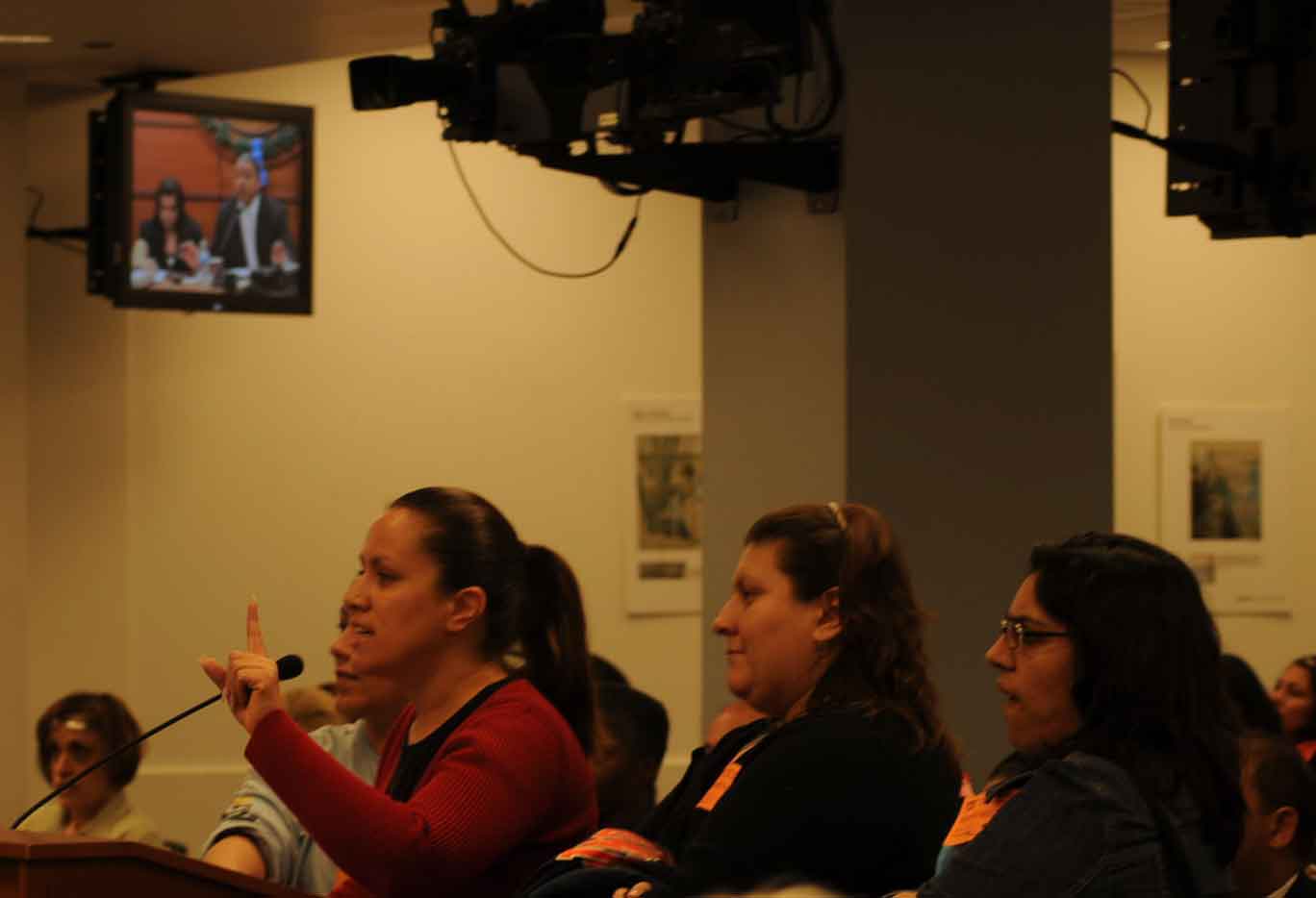 April 22, 2009. Fourteen months after she helped lead massive protests against the Chicago Board of Education's 2008 Hit List, Andersen Elementary School parent Carmen Soto (at microphone, above) returned to the Board to tell Board members and the public that CPS had lied to the parents, students and teachers of Andersen about the terms of the so-called "phase out" of Andersen in favor of the "LaSalle II" boutique school now expanding within the Andersen building. Last year, before the Board voted on February 27, 2008, on the 2008 Hit List, Andersen was told that the school would be "phased out" one grade at a time. By April 2009, CPS was dumping three grades at a time in order to speed up the takeover of the Andersen building by the "Yuppies of LaSalle" as they are being called in the community. With Soto at the April 22, 2009, Board meeting (above) were Maria Hernandez (to Soto's left), whose children attend Carpenter Elementary School, which is being phased out as part of the 2009 Hit List. On the left in the above photograph is Andersen LSC President Mildred Rodriguez, who also spoke out against the manipulations of Andersen and its children. Substance photo by George N. Schmidt. Although the meeting agenda included some of the most radical changes in the history of Chicago's public schools (including an expansion of year-round schools that the new CEO promises will eventually include all Chicago public schools), only 39 speakers had signed up to speak at the meeting. Of those four had spoken the previous month and were therefore ineligible to speak this month. Under the chairmanship of returned President Michael Scott, the exchanges with members of the public are less acrimonious than they had been when Rufus Williams had served as Board president, although the proposals before the Board were, if anything, even more controversial.
April 22, 2009. Fourteen months after she helped lead massive protests against the Chicago Board of Education's 2008 Hit List, Andersen Elementary School parent Carmen Soto (at microphone, above) returned to the Board to tell Board members and the public that CPS had lied to the parents, students and teachers of Andersen about the terms of the so-called "phase out" of Andersen in favor of the "LaSalle II" boutique school now expanding within the Andersen building. Last year, before the Board voted on February 27, 2008, on the 2008 Hit List, Andersen was told that the school would be "phased out" one grade at a time. By April 2009, CPS was dumping three grades at a time in order to speed up the takeover of the Andersen building by the "Yuppies of LaSalle" as they are being called in the community. With Soto at the April 22, 2009, Board meeting (above) were Maria Hernandez (to Soto's left), whose children attend Carpenter Elementary School, which is being phased out as part of the 2009 Hit List. On the left in the above photograph is Andersen LSC President Mildred Rodriguez, who also spoke out against the manipulations of Andersen and its children. Substance photo by George N. Schmidt. Although the meeting agenda included some of the most radical changes in the history of Chicago's public schools (including an expansion of year-round schools that the new CEO promises will eventually include all Chicago public schools), only 39 speakers had signed up to speak at the meeting. Of those four had spoken the previous month and were therefore ineligible to speak this month. Under the chairmanship of returned President Michael Scott, the exchanges with members of the public are less acrimonious than they had been when Rufus Williams had served as Board president, although the proposals before the Board were, if anything, even more controversial.
For the first time in four meetings, there were no visible protests against major Board policies, although several schools presented objections to things that were being done. No mention was made of the fact that earlier in April the Board had witnessed some of the largest turnouts in history at its hastily scheduled "Capital Development" hearings, despite the fact that the largest number of capital projects in recent memory were on the agenda.
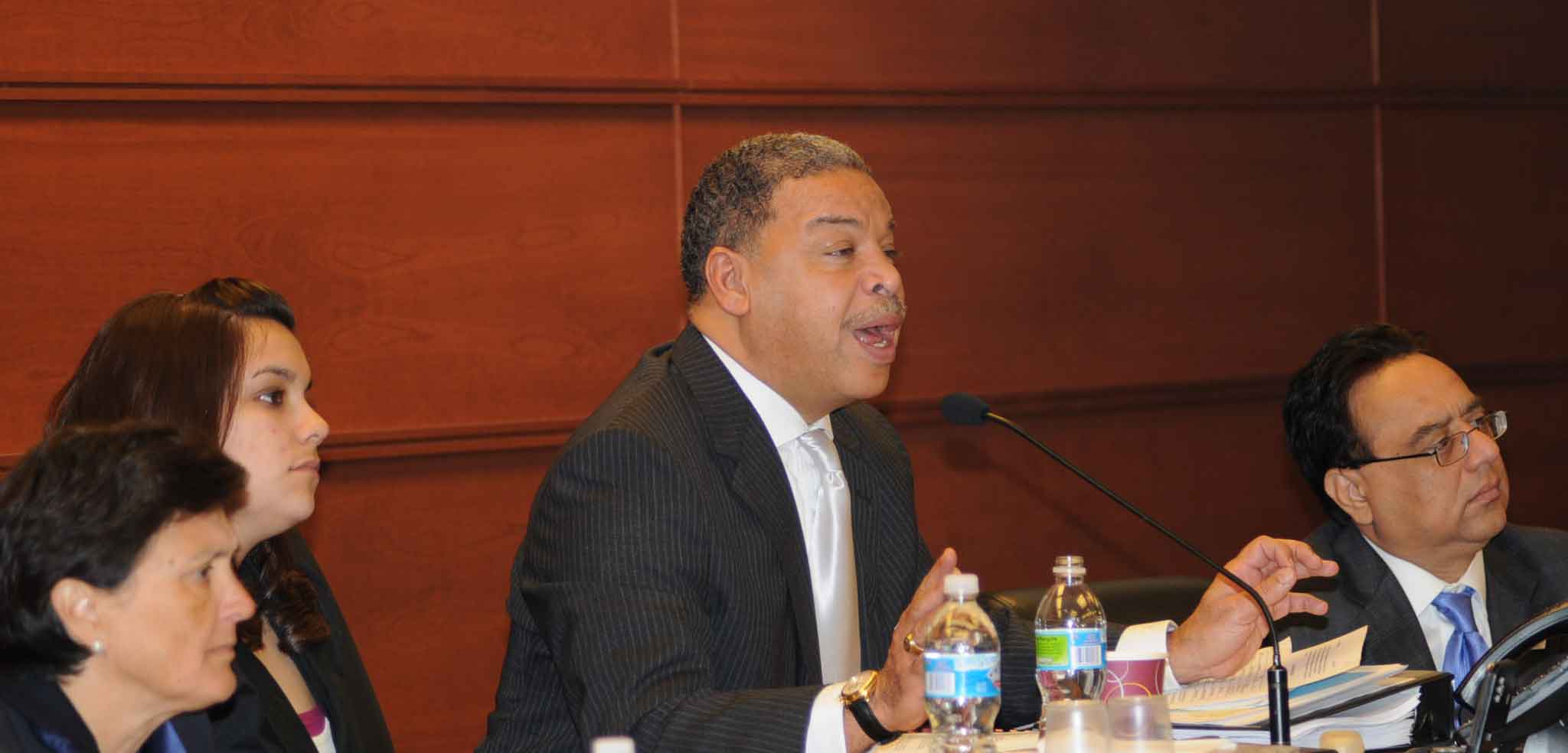 Chicago Board of Education President Michael Scott attempted to use his latest line -- "This is a very complicated situation" -- to the parents from Andersen and Carpenter. "It's not complicated at all," the parents told Substance outside the meeting. They are lying to the parents in order to destroy our schools." When the parents from Andersen and Carpenter continued to challenge Scott's smiles and sophistries, Scott signaled the Board's security to move in on them. The parents left the podium before a confrontation took place. In the above photo, Scott is flanked by Board members Tariq Butt (with glasses to Scott's left) and Board member Clara Munana (far left in photo). By 3:30 p.m., the seven members of the Chicago Board of Education has once again voted, unanimously and without discussion or debate. to approve virtually the entire agenda submitted by CEO Ron Huberman. Substance photo by George N. Schmidt.When critics presented facts that contradicted the way the Board was presenting an issue, Michael Scott repeated a refrain that was heard more than two dozen times during the meeting. "This is a complex issue," Scott would say, even if (as in the case of Andersen Elementary School), the simple fact was that a year earlier the Board had lied about the extent of a "phase out" at a school.
Chicago Board of Education President Michael Scott attempted to use his latest line -- "This is a very complicated situation" -- to the parents from Andersen and Carpenter. "It's not complicated at all," the parents told Substance outside the meeting. They are lying to the parents in order to destroy our schools." When the parents from Andersen and Carpenter continued to challenge Scott's smiles and sophistries, Scott signaled the Board's security to move in on them. The parents left the podium before a confrontation took place. In the above photo, Scott is flanked by Board members Tariq Butt (with glasses to Scott's left) and Board member Clara Munana (far left in photo). By 3:30 p.m., the seven members of the Chicago Board of Education has once again voted, unanimously and without discussion or debate. to approve virtually the entire agenda submitted by CEO Ron Huberman. Substance photo by George N. Schmidt.When critics presented facts that contradicted the way the Board was presenting an issue, Michael Scott repeated a refrain that was heard more than two dozen times during the meeting. "This is a complex issue," Scott would say, even if (as in the case of Andersen Elementary School), the simple fact was that a year earlier the Board had lied about the extent of a "phase out" at a school.
The agenda for the meeting was more than 240 pages long (in its preliminary form).
Because of additions from executive session will exceed more than 250 pages in its final form.
As usual, the vote to approve the items on the agenda was done unanimously and without debate when the Board emerged before 3:00 p.m. from its executive session. Both the public participation, the brevity of the time spent in executive session, and the speed with which the agenda was passed by unanimous vote were records.
Special Education scams exposed by parents, teachers, clergy
One of the more dramatic undercurrents during the April 22 Board meeting came as a result of more and more people uncovering the illegal moves by the Chicago Board of Education to destroy special education services in the public sector and force parents of special needs children to "choose" privatized services, which are becoming the only services CPS will allow the children to receive.
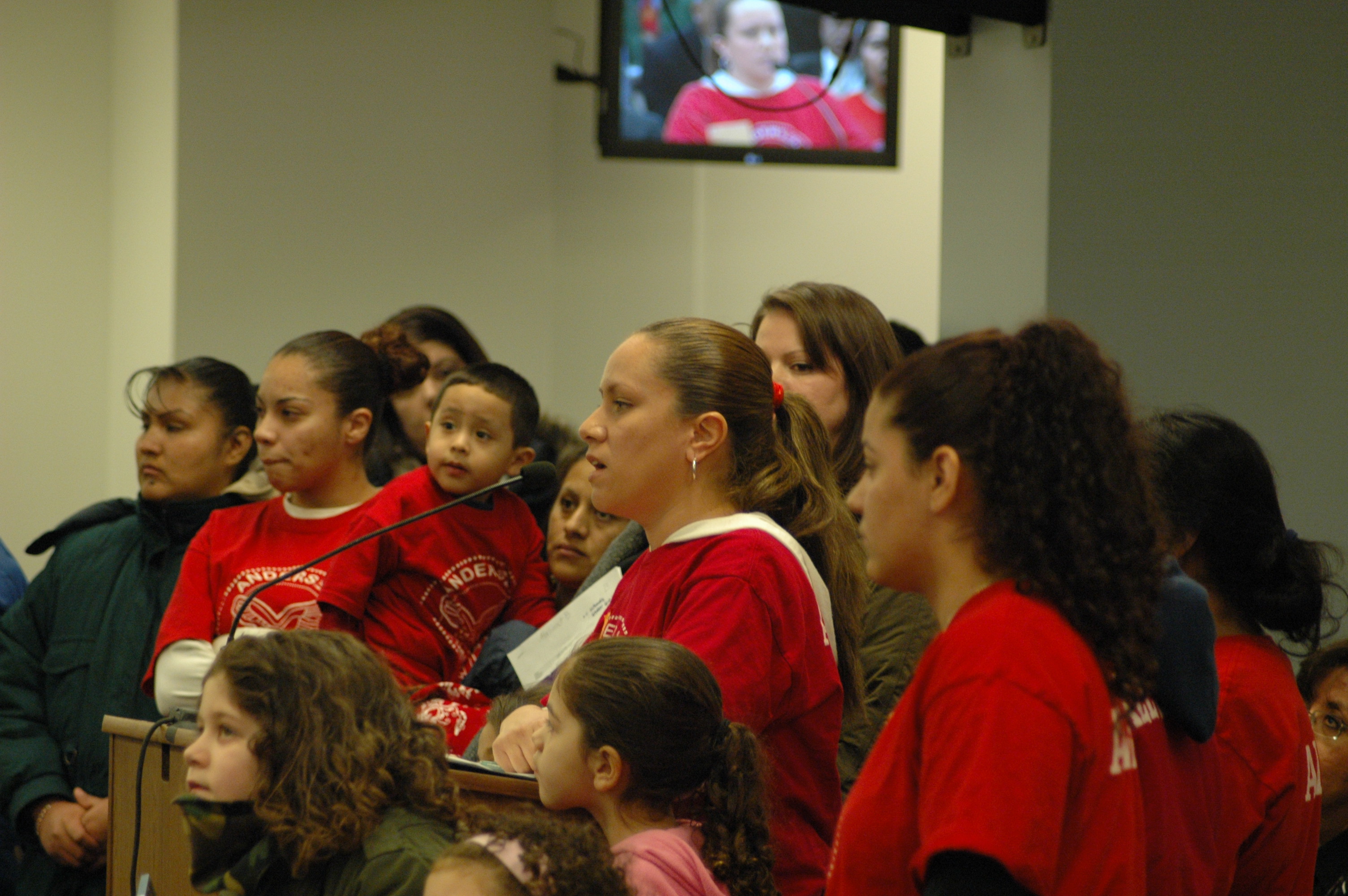 Carmen Soto on February 27, 2008, leading Andersen parents and children in opposition to the "infection" of their school by "LaSalle II." Despite promises from Arne Duncan (then CEO), Andersen's students are not being allowed to "phase out" until graduation, while the schools highly praised special education programs are being forced out, and parents are being forced to "choose" privatized special education services. Substance photo by George N. Schmidt.Although the forced privatization of special education began under the administration of former CEO Arne Duncan (who is now U.S. Secretary of Education), it has accelerrated under Duncan's successor, Ron Huberman. The basic outlines of the destruction of public special education services are straightforward. CPS destroys a program in a public school, usually by "relocating" it and promising recipients that the program will continue elsewhere. Duncan began this approach five years ago when he moved the children from Spalding (at Washington and Ashland) to Clemente and other schools, while destroying the program for children with autism at LeMoyne Elementary School.
Carmen Soto on February 27, 2008, leading Andersen parents and children in opposition to the "infection" of their school by "LaSalle II." Despite promises from Arne Duncan (then CEO), Andersen's students are not being allowed to "phase out" until graduation, while the schools highly praised special education programs are being forced out, and parents are being forced to "choose" privatized special education services. Substance photo by George N. Schmidt.Although the forced privatization of special education began under the administration of former CEO Arne Duncan (who is now U.S. Secretary of Education), it has accelerrated under Duncan's successor, Ron Huberman. The basic outlines of the destruction of public special education services are straightforward. CPS destroys a program in a public school, usually by "relocating" it and promising recipients that the program will continue elsewhere. Duncan began this approach five years ago when he moved the children from Spalding (at Washington and Ashland) to Clemente and other schools, while destroying the program for children with autism at LeMoyne Elementary School.
Protests against the destruction of public special education services were also voiced by four speakers organized by Montefiore Specialty School, which has served emotionally disturbed boys for 80 years.
Two members of the Montefiore staff spoke against the Board's cutting of the school's staff and cutting off of students who are being referred to the school. Assistant principal Otis Taylor outlined how the Board of Education's Office of Specialized Services was allowing elementary principals across Chicago to make fewer and fewer referrals to Montefiore, despite what is a growing and obvious need. Taylor also challenged the Board's plan to further reduce the number of staff at the school. Board President Michael Scott, feigning ignorance of the ongoing attacks on special education that began during his previous term at Board President (2001 - 2006), tried to claim that the student - "teacher" ratio at the specialty school was too high. Scott's math, which included teacher assistants and special education classroom assistants as "teachers", tried to reduce the ratio to "four to one." When the school's spokesmen pointed out the difference, Scott backed off.
A second staff speaker, teacher Kirkland Robertson, inadvertently exposed the prejudices of most of the Board members against public special education services. Robinson told the Board members that the programs at the school should be expanded, not cut. He mentioned the fact that many of the special needs students who had attended Montefiore in the past had benefited from shop programs, which had been cut. Robertson then passed a chess set which had been made by a Montefiore student to the Board members. After Scott briefly admired the workmanship of the set, he passed it to Board members Tariq Butt, Albertot Carrero, and Peggy Davis, who were observed by Substance belittling the project. The most dramatic defense of Montefiore came, however, not from staff members, but from a former student and from a clergy who stood with the school.
Walter White, who identified himself as a former Montefiore student, told the Board that he had lived in "11 foster homes, seven group homes, and three shelters" before he was 16 years old. He told the Board that Montefiore had provided the only stability in his life when he was younger.
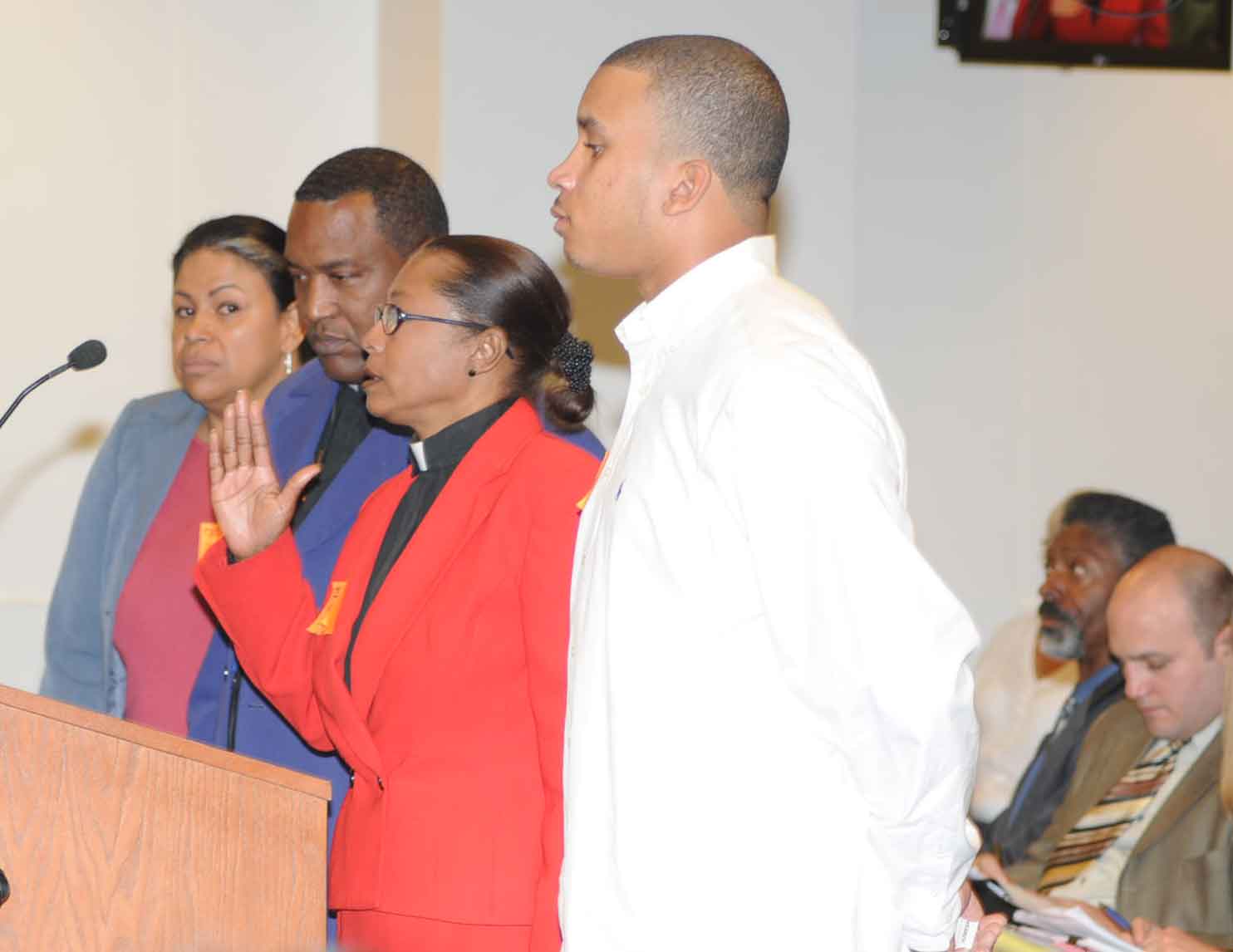 Rev. Louvenia Hood (above, gesturing) told the Board of Education that it should increase public school staffing for students with special needs, such as those at Montefiore, instead of privatizing the services, as it has been doing. More and more critics are pointing out that the Board of Education's ruthless privatization programs -- whether for charter schools of privatized services for special education students -- have been subjecting more and more of the city's most vulnerable youth to sexual predator or danger due to negligence. In the past six months, three Chicago charter school students drowned because a field trip was improperly supervised, and students at one charter school and one private therapeutic day school have been the victims of sexual abuse by deregulated staff. In their juggernaut to privatize as much of CPS as possible, members of the Board of Education belittle or neglect the achievements of schools like Montefiore, then encourage staff to sabotage those programs. On the right above is former Montefiore student Walter White, who gave dramatic testimony about the importance of the school in his life. Substance photo by George N. Schmidt.After Walter White spoke, Rev. Louvena Hood challenged the Board to expand Montefiore, not eliminate its programs. Rev. Hood presented the Board with statistics showing that during the past year, CPS had been focused on forcing children into privatized special education settings, while the Office of Specialized Services limited the number of students that Montefiore could take.
Rev. Louvenia Hood (above, gesturing) told the Board of Education that it should increase public school staffing for students with special needs, such as those at Montefiore, instead of privatizing the services, as it has been doing. More and more critics are pointing out that the Board of Education's ruthless privatization programs -- whether for charter schools of privatized services for special education students -- have been subjecting more and more of the city's most vulnerable youth to sexual predator or danger due to negligence. In the past six months, three Chicago charter school students drowned because a field trip was improperly supervised, and students at one charter school and one private therapeutic day school have been the victims of sexual abuse by deregulated staff. In their juggernaut to privatize as much of CPS as possible, members of the Board of Education belittle or neglect the achievements of schools like Montefiore, then encourage staff to sabotage those programs. On the right above is former Montefiore student Walter White, who gave dramatic testimony about the importance of the school in his life. Substance photo by George N. Schmidt.After Walter White spoke, Rev. Louvena Hood challenged the Board to expand Montefiore, not eliminate its programs. Rev. Hood presented the Board with statistics showing that during the past year, CPS had been focused on forcing children into privatized special education settings, while the Office of Specialized Services limited the number of students that Montefiore could take.
One of the schools that received the privatized referrals was Lawrence Hall, where a teacher was recently indicted for having sexual relations with one the school's emotionally distressed boys.
It is possible that privatization, deregulation, and "entrepreneurship" have failed as m iserably in Chicago's public schools as they have on Wall Street and across the world financial system. But because the victims of the policies of Michael Scott and the other members of the Chicago Board of Education are often poor or working class and not likely to be white, the ideology of privatization and deregulation still continues, as it did at the April 22, 2009, Board meeting.
The seven members of the Chicago Board of Education have all pushed various forms of deregulation and privatization during the years since Mayor Daley received complete power over the Board in 1995. The Board members generally ignored the perils that arise for many children -- especially the most vulnerable -- when those entrusted with their care are deregulated.
According to news reports (from February 23 of this year:
"Linda Pithyou, 29, is accused of having sex with the teen, a Lawrence Hall student 15 years old, in her car in the area of Sheridan Road and Pratt Boulevard in the Rogers Park neighborhood, said Andy Conklin, a spokesman for the Cook County State's Attorney's office."
Pothyou was a teacher at the private therapeutic school that receives the largest number of referrals of students who could be attending Montefiore.
CTU President continues speaking regularly at Board meetings
Chicago Teachers Union President Marilyn Stewart continued her streak of speaking regularly at public meetings of the Chicago Board of Education. On April 22, her prepared remarks were directed at two Board Reports giving a monopoly on employee investments to one company.
The following are the prepared remarks which Stewart read when she first spoke at the meeting:
Prepared Remarks of Marilyn Stewart, April 22, 2009
"As the President of the Chicago Teachers Union I have come here today to speak about the importance of choice in the 403B options that are available to my members. I am committed to protecting the interest of the current and retired members. It is very important that my members have options to meet their various needs.
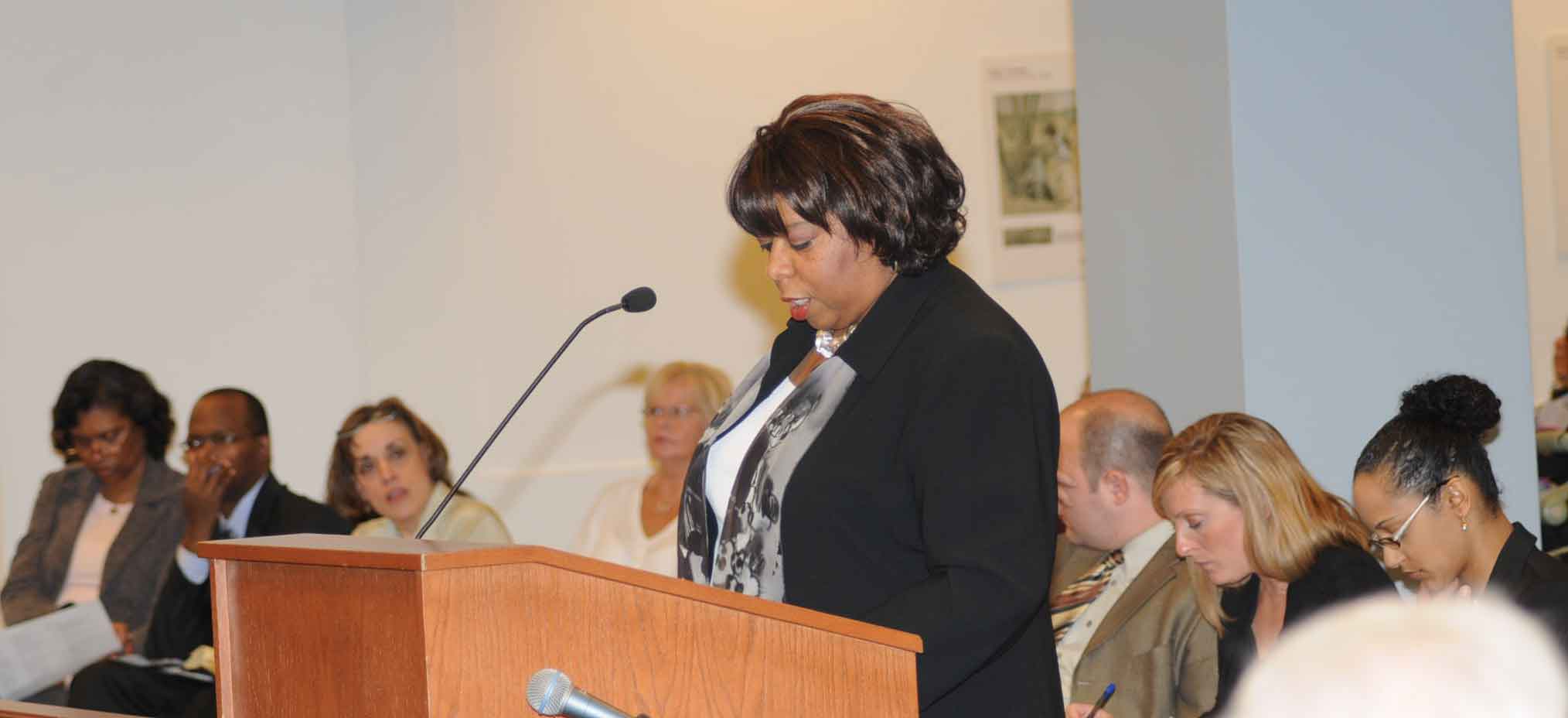 Chicago Teachers Union President Marilyn Stewart (above, reading the prepared remarks reproduced here) has begun speaking at every Chicago Board of Education meeting. Substance photo by George N. Schmidt."• First, just as a 'one size fits all' approach does not work in the classroom, it does not work for adults either. Some members prefer individual one-on-one consulting, over an internet service center approach (personified by Great West). I have been told by CPS that Great West will have 20 counselors for tens of thousands of plan participants! There will be little opportunity for the one-on-one consulting. Since the cost of the program is paid entirely by the participants, they should have some say in choosing a vendor that best meets their needs.
Chicago Teachers Union President Marilyn Stewart (above, reading the prepared remarks reproduced here) has begun speaking at every Chicago Board of Education meeting. Substance photo by George N. Schmidt."• First, just as a 'one size fits all' approach does not work in the classroom, it does not work for adults either. Some members prefer individual one-on-one consulting, over an internet service center approach (personified by Great West). I have been told by CPS that Great West will have 20 counselors for tens of thousands of plan participants! There will be little opportunity for the one-on-one consulting. Since the cost of the program is paid entirely by the participants, they should have some say in choosing a vendor that best meets their needs.
"• Secondly, any exclusive arrangement with ANY ONE provider raises questions about “pay to play” which can easily be avoided by offering multiple vendors for participant selection.
"• Third, as my members scramble to meet new certification guidelines, deal with daily CPS electronic glitches with IEPs and electronic attendance, and prepare for “payroll alignment” – not to mention retirees who can’t even cut a break when they await the correct amount on their first check – it is critical that employee disruption be avoided at all costs. The financial relationships that have been forged over the years should be maintained, especially in this economic environment.
"• The law only requires that you monitor the providers. Of the top 15 largest school districts in the country—all have maintained multiple providers except CPS.
"• Finally, moving to a single “BOOKKEEPER/PROVIDER” will create a loss of the guaranteed minimum death benefits caused by moving money from an annuity to a mutual fund that does not have stepped up death benefits. Since there are now so many employees who have account balances less that their plan contributions, this is of particular importance to my members.
Recently the Baltimore County Public Schools, a large K-12 school district, attempted to move from a multi-vendor to an exclusive arrangement. When the employees learned of this proposed change, they expressed their concern. The Board listened and quickly voted the proposal down, keeping the successful multi-vendor model intact. All of the existing vendors were subsequently retained for 5 years.
"I urge this Board to take the same courageous steps – VOTE DOWN THE RECOMMENDATION TO ENTER INTO AN AGREEMENT WITH GREAT WEST LIFE AND ANNUITY INSURANCE COMPANY FOR
DEFINED CONTRIBUTION RETIREMENT SERVICES.
"By the way, most of my members don’t even know about these planned changes. Real reform can only take place when the Board and its employees work together – having something done to you is far different than having a real voice at the table."
The Board didn't have to vote down the CEO's proposal. When it came out of executive session, the Board was told by the secretary that the two Board Reports dealing with the problems outlined by Marilyn Stewart had been withdrawn.
First iteration of this report posted to SubstanceNews at 7:30 a.m. on April 23, 2009. Final report due to be completed by midnight April 24, 2009, following the release of the "Action Agenda" of the Chicago Board of Education. Anyone wishing to reproduce in whole or in part this report or its graphics should credit as follows: "Copyright 2009 Substance, Inc., published originally at www.substancenews.net, all rights reserved." Those who utilize these materials are asked to contact Substance after use (which is permitted for classroom teachers and not-for-profit use) at Csubstance @ aol.com. Use without full attribution and credit is forbidden.

